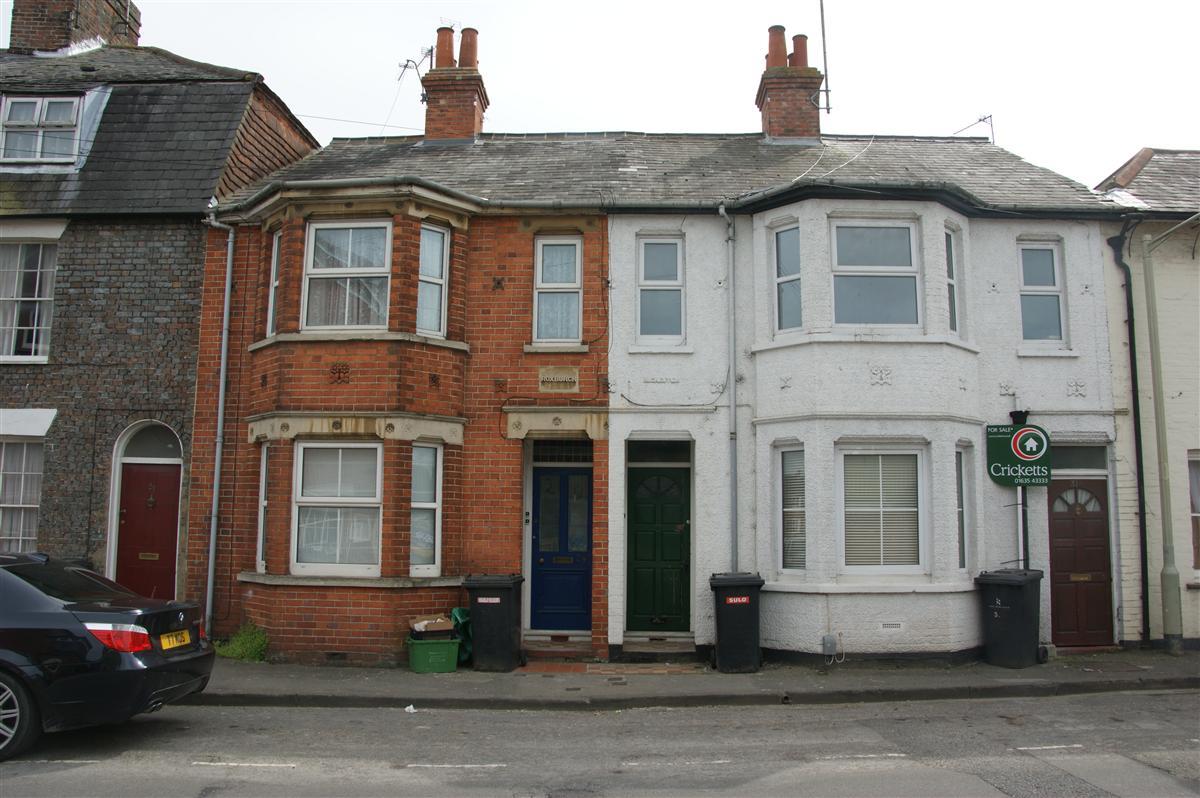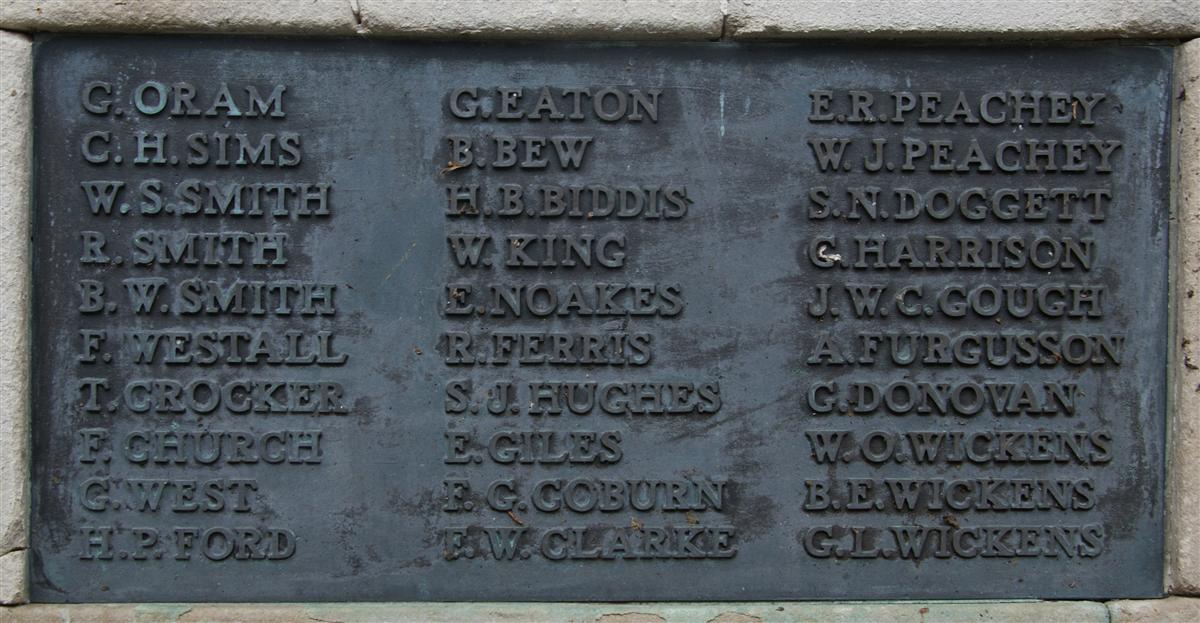Gerald Lionel Wickens
Private 18276 Gerald Lionel Wickens, 8th Battalion Royal Berkshire Regiment
Gerald was born in 1887 in Shilton, Oxfordshire, the seventh of William Maisey Wickens’ nine sons (there were also three daughters). William married twice, his first wife (Ann Collett) was the mother of his first four children, all sons; his second wife Ellen (née Targett) being the mother of eight children born between 1884 and 1894 – William being her fifth child and third son.
William Wickens was a baker, grocer and sub-postmaster in Shilton (when William was born there in 1838 Shilton was in a detached portion of Berkshire, the country boundaries were rationalized in 1844).
 The family home in Enborne Road (now Pound Street). Ilchester is the white painted house on the right. |
William, who was twenty years older than Ellen, died in 1909 and, in 1911, Ellen moved south to Newbury. It is not known why she chose Newbury (her family roots were in the Bath area). The family set up home in a newly built house named llchester in Pound Street, which was then part of Enborne Road). By this date most of the children were old enough to live independent lives, but six of them made the move with their mother.
The Wickens boys were apprenticed (which would usually be at the age of 14) into various trades; Gerald became a baker, working for George Brown at the Eclipse Bakery in Eastbury and boarding with the Brown family.
In 1914 Gerald married Daisy Maria Hawkins, originally from Isle of Wight they met in Eastbury where Daisy’s father, Charles had found work on a farm.
When war broke out it was not long before Gerald, along with his elder brother William, went to join the local regiment, the Royal Berkshires (their brothers Bertram and Cyril were already serving with the regiment's territorial battalion). The two brothers were sent to the 9th Battalion, then preparing as a combat battalion destined for service at the front once the raw recruits had been turned into soldiers. However, the 9th Battalion never saw service, instead, in July 1915, it was redesignated as a reserve battalion, where recruits could be trained and veterans recovering from wounds or illness could be brought back to combat fitness.
The fighting battalions of the Royal Berks were in constant need of replacements to keep them up to strength (or as close to it as practicable). On 30 September 1915 Gerald and William landed in France among a draft of replacements. They were sent to the 8th Battalion which days before had suffered very heavy casualties during the opening days of the Battle of Loos. A draft of 52 men reached the 8th Battalion on 4 October, it is likely that the Wickens brothers were among this group.
The following day the battalion was sent back into the firing line, despite having had far to little time to regroup, take on replacements and prepare themselves. After the losses of the 25 September they were at little better than half their normal strength. On 9 October the battalion went over the top in an abortive attack on German positions near Hulloch. When the roll call was made after the attack was abandoned only one of the brothers responded; William was missing, eventually being declared as killed in action that day - nine days after joining the battalion.
Gerald was attached to a trench mortar battery, almost certainly operating light mortars (heavy mortars were manned by the artillery regiments). Whilst this would have meant that he was unlikely to be ordered over the top in the first wave of an attack it was, nevertheless, a very dangerous posting. Mortars were often the infantryman’s most reliable artillery – when a message could not be got back to the big guns to the rear it was the mortar batteries that would be required to knock out machine gun nests or disrupt enemy counter attacks. Light mortars could be taken forward immediately to help consolidate and ground taken. They were a very effective weapon and, like all effective weapons, the enemy was keen to knock out mortar crews as quickly as possible by any means possible.
George Wear, a Lieutenant in the Royal Field Artillery commanded a heavy mortar battery and wrote in his diary: Some time later I was fortunate enough to get myself transferred to a trench mortar battery, then popularly known as "The Suicide Club". Here I found myself in as jolly a crowd as I ever met in the War, and amongst whom I spent my happiest times. For they were happy times, in spite of the greater discomfort and undoubtedly greater danger than I had experienced in a field battery.
The small guns fired a 60-lb. bomb for a maximum distance of 500 yards, and consequently were usually in or near the front-line trench. The bombs did great damage to wire and trenches and naturally enemy retaliation was prompt and heavy whenever we fired.
Almost a year after Loos the 8th Battalion was once again involved in a major offensive, the Battle of the Somme. The battalion was fortunate enough not to be heavily involved most of their actions being in support of other battalions. In late August they found themselves in support trenches north of Mametz Wood. On 27 August they came under heavy bombardment; Gerald was one of two men killed by the enemy shellfire.
Newbury Weekly News, 7 Sep 1916 p8 – Local War Notes
Mrs E Wickens, of “Ilchester”, Enborne-road, has just received the sad news that her third son, Pte G L Wickens, of the 1st Trench Mortar Battery, 1st Infantry Brigade, has been killed in action by shell fire. He leaves a wife and baby. Mrs C Wickens, who has had four sons serving at the Front. Last October it was officially reported by the War Office that her eldest, Pte W C Wickens, 8th Batt Royal Berks, was missing, and no news has since been obtained of him. He leaves a wife and two children. Her other two sons, who joined at the beginning of the war, are still at the Front in the 1/4th Royal Berks.
 Gerald's name on Newbury War Memorial - below those of his brothers. (bottom right) |
Gerald has no known grave, he is remembered on the massive Thiepval Memorial to the missing of the Somme. Locally his name is on the Newbury Town War Memorial.
Five Wickens brothers went to war, all served in France and Flanders with the Royal Berkshire Regiment; William’s was the shortest period of active service; Cyril (b 1893) spent the longest time at the front, serving throughout the war with the 1st/4th Battalion he was in France for over three years. Bertram (b 1888) went out with Cyril, but was killed in 1917 during the German withdrawal to the Hindenburg Line. As already noted Gerald (b 1890) went out with William to the 8th Battalion, dying during the Battle of the Somme in 1916. The fifth brother, Raymond (b 1894) enlisted in November 1915 and joined the 8th Battalion in the field sometime in 1916, not long before Gerald was killed. Raymond survived the war living through the 8th Battalion’s darkest hours, when they were reduced to a total of 90 men and a few officers during the German Spring Offensive on 1918.
[Thanks to Karen Newbery for her help in researching this soldier.]

Find a memorial :
| Died this day: | |
| 02 March 1918 | |
| N G Burgess | |
| Newbury |

Like this site? Show your appreciation through a donation to a great charity.